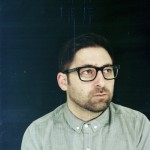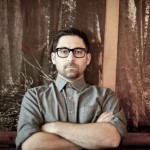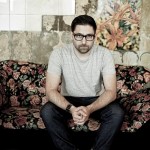![Cosmin TRG: „I have always had a weakness for complicated things” [EN]](http://www.techno.ro/wp-content/uploads/2012/11/cosmin.jpg)
Cosmin TRG: „I have always had a weakness for complicated things” [EN]
Cosmin TRG is an artist with whom we could’t find the time to catch up. With his recent gig in Cluj-Napoca at Boiler Club, it was about time to ask him a few questions about his music and life.
Let us start with the beginning, what dreams did you have as a child regarding your future? Did you imagine yourself ending up in the music industry, performing in front of huge crowds?
Cosmin: When I was a teenager I dreamt about quite different things, I would see myself doing all sorts of things which later on came into being more or less. Perhaps languages have changed, but my purpose has remained the same, to express and to exchange ideas with the public. What I do now is basically a process of translation, and I have happened to find most of the terms in music.
To what extent does the period spent in the confined society of Romania before 1989 reflect on your sound?
Cosmin: I might say that the period before ’89 is reflected in my quests rather than my sound. I was only 8 years old at the „revolution”, but the events and the social climate of the period are still very familiar, like a time spent in a suspended dimension, beyond real and for that I’m trying to find explanations, „keys” of interpretation.
Do you consider the time spent here in the country as a chance because it offered a unique medium for development, all bad things aside, or do you see it in a negative way, because it isolated you from what was happening in the West?
Cosmin: I have been asked this question before, I don’t have an answer yet and I don’t think I will. It would mean imagining „how it would have been had it been otherwise”, and this is useless. Let’s just say that, if I had been elsewhere, some place where it would have been easier to start my career in music, I may have never done it, as it wouldn’t have been a challenge. I have always had a weakness for complicated things. I think I made up for what was to be recovered, and I have synchronized my work in time. I also think that we victimize ourselves too easily, there are other places in the world where it is infinitely more difficult to achieve what is relevant from a cultural point of view and to bring your own contribution to it.
In the last few years you have spent a lot of time away from home, what do you miss the most about your birthplace when you are travelling?
Cosmin: Friends, a certain sensation of familiarity, or maybe of affiliation, but here it is even more complicated because belonging somewhere continues to be my last priority.
Speaking of native soil, how would you describe the Romanian electronic music scene as seen from outside? Do you think it has what it takes to overcome this status?
Cosmin: If we were to talk about artists who visit Romania, i.e. the „party” scene, I think most of them had positive experiences. And if so, the Romanian scene is by far the only one having issues of „expansion”. Most of whom I have lately spoken to praise the public, the producers, the DJS, and not just out of courtesy. Negative aspects are seen as curiosities or cultural differences, which is what they probably are. If you refer to production, I think that this aspect is more delicate, in the sense that there are artists who are well aware of what is happening outside and who can produce something original, and there is a certain bubble made up of artists, scenes, micro-scenes which are somehow behind the current developments. I don’t think that this is a bad thing, it’s just that the backward tendencies maintain a monolithic state in a field which is in fact based on dialogue. The potential to overcome this condition depends on the capacity of tolerance, and, of course, a mild social climate for arts. We must admit that at least these days, the climate is not really a gentle one, and not only here. The Romanian scene looks very interesting from outside, but in order to enter the international dialogue it must maintain its quality, and it must surprise.
Your productions are characterized first of all by the exactness with which they are constructed and by the fact that they seem to be very cerebral. Is this because you’re trying to insert hidden messages in your releases?
Cosmin: Thank you for the nice words, although I don’t think my productions are very exact or cerebral. I have a tendency towards simplifying the message, I don’t know if I manage to convey this. I try to make my tracks as personal as possible, and to take them as far away as possible from established formulae. Let’s just say that of the tracks I bring to the club, those that I like the most and which work the best are by far the simplest and less cerebral, more raw and more straightforward. At the same time I love heavy tracks … it’s all very complicated.
In your vision, what should music convey beyond sounds? Do you see a special role in society for music?
Cosmin: I wouldn’t speculate more than I already have, I wouldn’t risk formalities. I think that music should be both fun and inspiring. I wouldn’t assign it a role, that would make it only functional, like the music from an elevator or the „new age” at the dentist.
Club culture has reached a point of climax a few years ago and since then everything seems to plunge in. What is the reason of this decline, to your mind, and how could the situation improve?
Cosmin: I can’t speak of a decline, on the contrary – it seems to me that there is a renewed interest for club music, it all goes round anyway. The naughties ravers now have mortgages and children. Now another kind of public emerges, there is a dialog between genres, between producers. We witness collaborations which would have been impossible in the past. Scenes are no longer sealed. I find this incredible. A relevant example would be the promoters in Ibiza, which started to observe what happens outside worn formulas. Had you told me last year that I would perform this summer in Space Ibiza, in the main room, and that the whole evening will be very far from any Balearic clichés, I wouldn’t have believed it. This shows that the public is changing, it is sensitive to other factors. That there is consumer electronic music, with absurd characters and clueless sponsors. It’s somewhat unavoidable.
You are one of the few, maybe the only Romanian producer of electronic music, who has a successful story after approaching the West stage. What would you advise those who would like to follow your footsteps?
Cosmin: Again, thank you for your appraisal, I don’t know whether I am in a position to give advice. And I don’t know if it is correct to say „Western scene”, there are no segregations of that sort in music. Everything that has happened to me has been organic, I don’t think that there is a formula. I think there are a few mistakes that are easy to avoid: victimizing yourself, taking seriously what others say (good or bad), isolating yourself in one scene, harassing labels with unfinished tracks and so on. To be frank: Romanian artists who are successful outside Romania are exactly those who complain less, and who have an original fiber, coincidental or not.
We also know you are trying as much as possible to not fall behind with reading. What do you have on your nightstand at the moment? Have you come across a title that you would recommend to those in the music scene?
Cosmin: Recently I have developed this pretty bad custom of starting more than one book at a time, I hope I will give it up soon. On a recommendation from a friend I discovered a young author, Joe Dunthorne, from which I read Submarine (a very good film has been made after it in 2010) and from which I have started Wild Abandon. Joe Dunthorne is reviewing in The Guardian and so I learnt about Ned Beauman – The Teleportation Accident. Between short stories of Vonnegut and episodes of The Wire. Attention deficit disorder at its best…
Has there been a moment when a reading has had a direct effect on a production? In other words, was there a moment when you’ve been so impressed with the atmosphere of a writing that you wanted to transfer it in music?
Cosmin: Michel Houellebecq – The possibility of an island, sometimes no matter what, I can’t refrain from thinking of the last paragraph. But it seems that Iggy Pop has already composed something based on that book, so I let it go…
Your music develops from one release to another, which is normal in fact. Do you have any long term action plan or do you just abandon yourself to the uncertain? What are your long term goals?
Cosmin: A long time ago I realized that nothing is controllable, so in the long run I just wish to have the power to express what I have to say. And to have something to say. The rest should come naturally.
I have just read a report of the Vatican expressing fear regarding the possibility that Europe will be taken over by Islam. This is just a story of the many other dire predictions. In your opinion, how will the world look in 30 years from now?
Cosmin: I don’t know how it will look tomorrow, let alone in 30 years time. I have never imagined that it is possible to destroy the Romanian Cultural Institute, but it has been done. I have never thought that someone like Romney will be taken seriously by someone, and still some people will vote for him. At the same time, I didn’t expect to find English ales in Romanian pubs or wines from Dobrogea in Amsterdam shops, but I have, so it’s not all that gloomy. Seriously, I think it all depends very much on how much we invest in education, tolerance, civic society. All the iPads and lasers and medical miracles will be totally irrelevant unless we can find solutions to at least put up with each other.
More about Cosmin TRG is available at the following links
CosminTRG.com
twitter.com/CosminT




